|
|
|
Sort Order |
|
|
|
Items / Page
|
|
|
|
|
|
|
| Srl | Item |
| 1 |
ID:
125398


|
|
|
|
|
| Publication |
2013.
|
| Summary/Abstract |
Utilizing a longitudinal study design, the impact of the 2011 accident in Fukushima on acceptance of nuclear power and the evaluation of several scenarios with different percentages of nuclear power were examined. Mail surveys were conducted in the German-speaking part of Switzerland. The first survey took place before the accident in Fukushima (Autumn 2010), the second survey immediately after the accident (March 2011), and the third survey half a year after the accident (October 2011). A sample of 463 persons participated in all three surveys. The accident had a negative impact on the acceptance of nuclear power. The mean change was moderate, and high correlations between the measurement points were observed. Overall, participants thus showed rather stable attitudes towards nuclear power across the three measurement waves. Results of the present study demonstrate the importance of prior beliefs and attitudes for the interpretation of an accident. The evaluation of the various scenarios was strongly influenced by participants' pre-Fukushima attitudes towards nuclear power.
|
|
|
|
|
|
|
|
|
|
|
|
|
|
|
|
| 2 |
ID:
124590
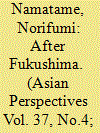

|
|
|
| 3 |
ID:
126259


|
|
|
|
|
| Publication |
2012.
|
| Summary/Abstract |
Even amidst the devastation following the earthquake and tsunami in Japan that killed more than 20,000 people, it was the accident at the Fukushima Daiichi nuclear power plant that led the country's prime minister, Naoto Kan, to fear for "the very existence of the Japanese nation." While accidents that result in mass radiological releases have been rare throughout the operating histories of existing nuclear power plants, the growing number of plants worldwide increases the likelihood that such releases will occur again in the future. Nuclear power is an important source of energy in the U.S. and will be for the foreseeable future. Accidents far smaller in scale than the one in Fukushima could have major societal consequences. Given the extensive, ongoing Nuclear Regulatory Commission (NRC) and industry assessment of nuclear power plant safety and preparedness issues, the Center for Biosecurity of UPMC focused on offsite policies and plans intended to reduce radiation exposure to the public in the aftermath of an accident. This report provides an assessment of Japan's efforts at nuclear consequence management; identifies concerns with current U.S. policies and practices for "outside the fence" management of such an event in the U.S.; and makes recommendations for steps that can be taken to strengthen U.S. government, industry, and community response to large-scale accidents at nuclear power plants.
|
|
|
|
|
|
|
|
|
|
|
|
|
|
|
|
| 4 |
ID:
108805
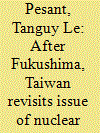

|
|
|
| 5 |
ID:
151874
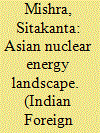

|
|
|
| 6 |
ID:
157742
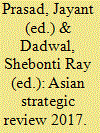

|
|
|
|
|
| Publication |
New Delhi, Pentagon Press, 2018.
|
| Description |
xi, 192p.hbk
|
| Standard Number |
9789386618283
|
|
|
|
|
|
|
|
|
|
|
|
Copies: C:2/I:0,R:0,Q:0
Circulation
| Accession# | Call# | Current Location | Status | Policy | Location |
| 059322 | 333.79/PRA 059322 | Main | On Shelf | General | |
| 059323 | 333.79/PRA 059323 | Main | On Shelf | General | |
|
|
|
|
| 7 |
ID:
112622
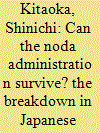

|
|
|
| 8 |
ID:
142010
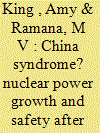

|
|
|
|
|
| Summary/Abstract |
Since the Fukushima disaster in Japan, the Chinese government has undertaken a number of measures to improve the safety of its nuclear facilities while simultaneously committing to a rapid expansion of nuclear power capacity. We explore the tension between these twin commitments, examining China's record of implementation of nuclear safety measures since Fukushima. We investigate how nuclear safety interacts with other priorities in shaping decisions about inland nuclear power stations and nuclear reactor design choice. We find that various safety measures have been implemented since 2011, but where their implementation competes with other priorities— such as the economic interests of local governments and nuclear corporations, and central government energy and development targets—safety is not always the primary concern.
|
|
|
|
|
|
|
|
|
|
|
|
|
|
|
|
| 9 |
ID:
135524
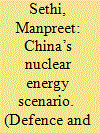

|
|
|
|
|
| Summary/Abstract |
China’s rapid socio-economic transformation, which is today being studies as a model of unprecedented economic growth, was enabled by a phenomenal surge in electricity production and consumption. from a total electricity production base of only 282 billion kilowatt hours (kWh) in 1979, china is today the largest electricity producer at 4604 billion kWh (compared to India’s 835 billion kWh).
|
|
|
|
|
|
|
|
|
|
|
|
|
|
|
|
| 10 |
ID:
126086


|
|
|
|
|
| Publication |
2012.
|
| Summary/Abstract |
Despite the tragic accidents in Fukushima and Chernobyl, the nuclear power industry will continue to contribute to the production of electric energy worldwide until there are efficient and sustainable alternative sources of energy. The Chernobyl nuclear accident, which occurred 26 years ago in the former Soviet Union, released an immense amount of radioactivity over vast territories of Belarus, Ukraine, and the Russian Federation, extending into northern Europe, and became the most severe accident in the history of the nuclear industry. This disaster was a result of numerous factors including inadequate nuclear power plant design, human errors, and violation of safety measures. The lessons learned from nuclear accidents will continue to strengthen the safety design of new reactor installations, but with more than 400 active nuclear power stations worldwide and 104 reactors in the Unites States, it is essential to reassess fundamental issues related to the Chernobyl experience as it continues to evolve. This article summarizes early and late events of the incident, the impact on thyroid health, and attempts to reduce agricultural radioactive contamination.
|
|
|
|
|
|
|
|
|
|
|
|
|
|
|
|
| 11 |
ID:
115402
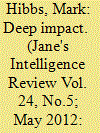

|
|
|
| 12 |
ID:
107114
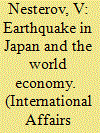

|
|
|
|
|
| Publication |
2011.
|
| Summary/Abstract |
THE FULL EXTENT OF THE DAMAGE caused to the Japanese economy by the March 11 earthquake and tsunami has yet to be assessed, but experts say that it could be the worst in the country's history.
Hundreds of plants and factories across Japan, including Toyota and Nissan car factories, were shut down as a result of damage or power outages. Electricity suppliers were obliged to impose rolling blackouts throughout the country because they could not meet demand. Thousands of homes were destroyed, and about 2 million people were left without electricity and water. AIR Worldwide, a U.S.-based consulting group, predicted on March 13 that insured property losses from the earthquake alone would range from $15 billion to $35 billion.
|
|
|
|
|
|
|
|
|
|
|
|
|
|
|
|
| 13 |
ID:
108878
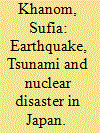

|
|
|
|
|
| Publication |
2011.
|
| Summary/Abstract |
This paper attempts to assess the impacts of the devastating natural disaster - earthquake followed by tsunami, that shook Japan on 11 March 2011, from socio-economic and development point of view. The intensity of the disaster was reflected through a destructive earthquake measuring 8.9 on Richter scale along with a tsunami at a speed of 500 miles/hour. Though, Japan is technologically and economically developed, it described the disaster as the worst crisis in the 65 years of its history since the end of World War II. Huge humanitarian crisis and massive disruption of industrial supply chains negatively affected the economic growth of Japan and put enormous stress on the psyche of Japanese people. The plight of the people had been compounded further by the threat of radiation exposure from the damaged reactors of nuclear power plants at Fukushima. The mishap at nuclear power plants at Fukushima posed some serious questions to the world: how safe nuclear power plants really are? Should the world look for a safer alternative to power problems? The disaster in Japan and its consequences have some serious impacts on Bangladesh from a development perspective. Japan has long been the principal donor and biggest development partner of Bangladesh. But the ongoing crisis in Japan may pose a threat or create some degree of uncertainty to the long term development planning of Bangladesh. Besides, the catastrophic experience of Japan has made Bangladesh rethink about its readiness to encounter similar disasters. As a climate induced vulnerable country, Bangladesh should strengthen its disaster management system by ensuring early warning system, as well as improving rescuing and relief management mechanism to combat such natural calamities.
|
|
|
|
|
|
|
|
|
|
|
|
|
|
|
|
| 14 |
ID:
111761
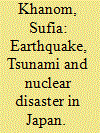

|
|
|
| 15 |
ID:
125584


|
|
|
|
|
| Publication |
2013.
|
| Summary/Abstract |
The Fukushima nuclear disaster has significantly changed public attitudes toward nuclear energy. It is important to understand how this change has occurred in different countries before the global community revises existing nuclear policies. This study examines the effect of the Fukushima disaster on public acceptance of nuclear energy in 42 countries. We find that the operational experience of nuclear power generation which has significantly affected positive public opinion about nuclear energy became considerably negative after the disaster, suggesting fundamental changes in public acceptance regardless of the level of acceptance before the disaster. In addition, contrary to our expectation, the proportion of nuclear power generation is positively and significantly related to public acceptance of nuclear energy after the Fukushima accident and government pressure on media content led to a greater decrease in the level of public acceptance after the accident. Nuclear energy policymakers should consider the varied factors affecting public acceptance of nuclear energy in each country depending on its historical, environmental, and geographical circumstances before they revise nuclear policy in response to the Fukushima accident.
|
|
|
|
|
|
|
|
|
|
|
|
|
|
|
|
| 16 |
ID:
107115
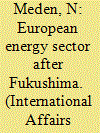

|
|
|
|
|
| Publication |
2011.
|
| Summary/Abstract |
THE EUROPEAN COMMISSION'S RESPONSE to the Fukushima nuclear disaster is at odds with conventional notions of a cumbersome EU bureaucracy. The decisions to conduct stress tests on European nuclear power plants (NPPs) and develop a new set of nuclear safety standards were made very quickly. A lively debate is underway at the expert level on how the EU energy sector should develop considering Japan's bitter experience. The debate takes place at a time when the European Commission is working on a document laying down guidelines for EU energy policy to 2050, and in this sense it can influence the EU's long-term strategy, which is also important to Russia.
|
|
|
|
|
|
|
|
|
|
|
|
|
|
|
|
| 17 |
ID:
107831


|
|
|
| 18 |
ID:
108806
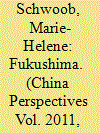

|
|
|
| 19 |
ID:
108042
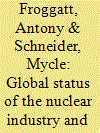

|
|
|
|
|
| Publication |
2011.
|
| Summary/Abstract |
Three factors - meeting climate change objectives, dwindling conventional fossil fuel reserves and rapidly growing energy demand from emerging economies - require the rapid transformation of the global energy industry. Within this context, nuclear power is being promoted in new countries and regions of the world. However, even prior to the Japanese earthquake and tsunami and subsequent nuclear crisis at Fukushima, the global expansion of nuclear power was occurring in a handful of countries only and globally reactor numbers were falling. While it is too early to make accurate forecasts of the long-term impact of Fukushima, it is clear that most countries are reviewing from a safety and/or policy perspective their existing and future programmes. The impact that these will have on future reactor orders will be dependent not only on the engineering and operational recommendations, but also on the economic and financial viability of the non-fossil fuel alternatives.
|
|
|
|
|
|
|
|
|
|
|
|
|
|
|
|
| 20 |
ID:
119701
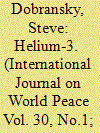

|
|
|
|
|
|
|
|